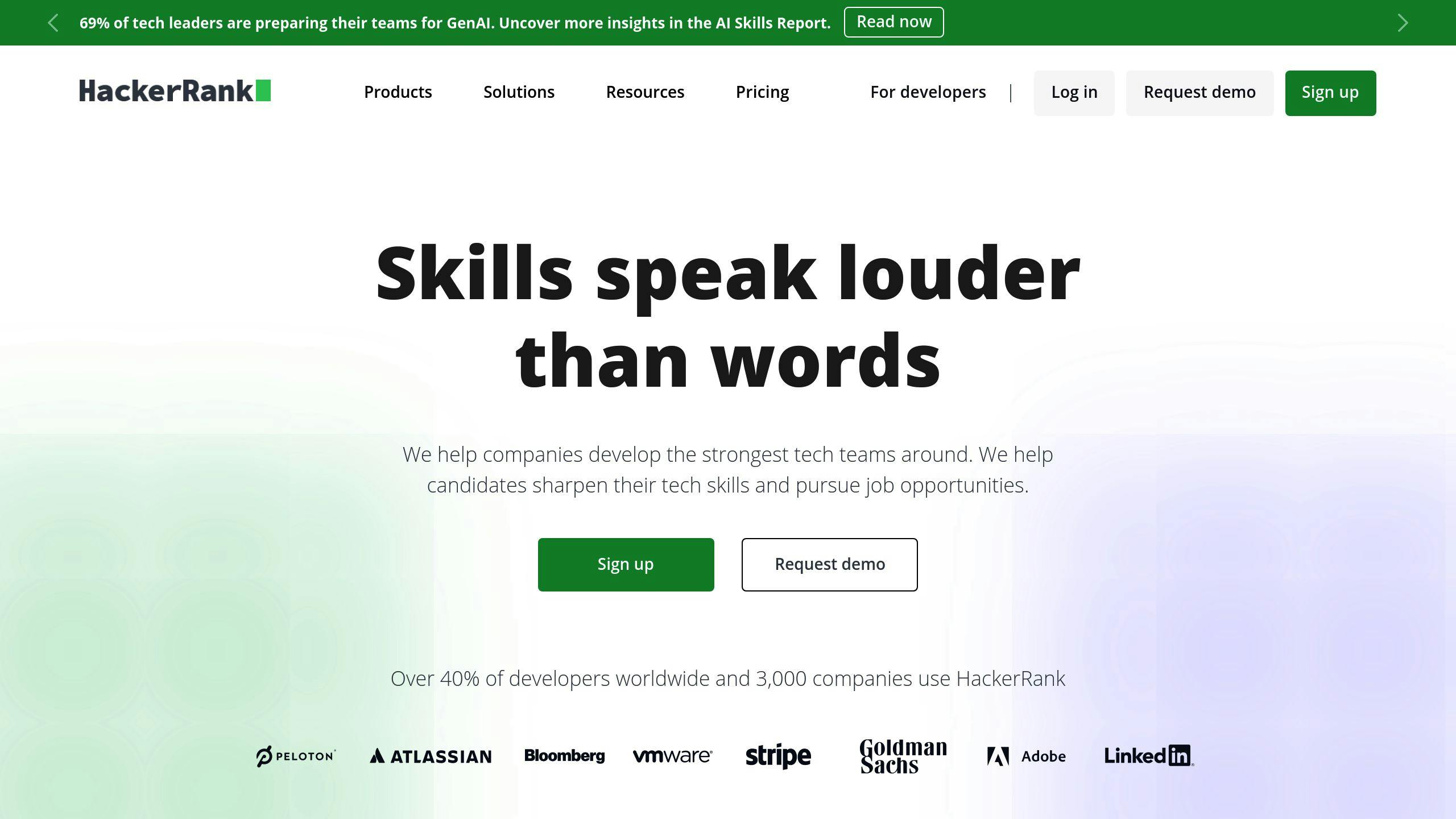Want to ace your coding interviews? Platforms like HackerRank and LeetCode can help you prepare effectively. Here’s how:
- Start with Basics: Use HackerRank’s beginner-friendly challenges to build a strong foundation.
- Level Up: Transition to LeetCode for advanced, interview-specific problems.
- Practice Daily: Solve curated problem lists like LeetCode’s "Top 100 Liked Problems."
- Mock Interviews: Simulate real interviews to improve timing, communication, and problem-solving.
- Focus on Key Techniques: Break down problems, test edge cases, and explain your approach clearly.
Quick Comparison: HackerRank vs. LeetCode

| Feature | HackerRank | LeetCode |
|---|---|---|
| Learning Path | Beginner-friendly "30 Days of Code" | Advanced problems with discussions |
| Interview Focus | Broad programming topics | Primarily coding interviews |
| Practice Environment | Basic to intermediate challenges | Mock interviews, competitive contests |
| Skill Development | Gradual learning | Heavy focus on algorithms & data structures |
| Fresher Support | Structured beginner resources | Community-driven problem-solving |
Tip: Combine both platforms for a step-by-step preparation strategy. Start simple, practice consistently, and track your progress to build confidence. Ready to get started? Let’s dive in.
How to Start Leetcode (as a beginner)
Starting with Basics: Problem Solving Fundamentals
Begin with Simple Problems
Focus on solving basic problems first. This helps you build confidence and develop clear problem-solving patterns. As Samuel Taylor suggests, it’s important to prioritize clarity and outline your code while working through these problems [1]. Platforms like HackerRank offer beginner-friendly challenges that provide a solid starting point for practice.
Once you feel comfortable with the basics, start tackling more complex problems to expand your skills.
Move to Intermediate Challenges
When you’re ready, move on to intermediate challenges. These often include concepts like binary trees, hash maps, sorting, and searching – topics that are common in interviews with companies like Google and Amazon. These problems typically combine multiple ideas and require more advanced strategies.
| Concept Type | Example Problems |
|---|---|
| Data Structures | Binary Trees, Hash Maps |
| Algorithms | Sorting, Searching |
| System Design | Basic scalability |
Use Curated Problem Lists
Curated problem lists, such as LeetCode’s "Top 100 Liked Problems", are excellent resources. They focus on essential algorithms, data structures, and commonly asked interview questions. These lists:
- Highlight key algorithms and data structures
- Include problems frequently seen in interviews
- Offer community discussions and detailed solutions
Make it a habit to practice daily. Use features like HackerRank’s progress dashboard to track your improvement and identify areas where you need more practice [2].
"Success in coding interviews requires understanding concepts and patterns, not just solving problems." – Samuel Taylor [1]
With consistent effort and the right tools, you’ll be well-prepared to refine your skills further.
Effective Problem-Solving Techniques
Break Down Problems
Start by carefully reading the problem to pinpoint the inputs, outputs, and constraints. This step allows you to plan your solution logically before diving into coding. It’s also a skill that interviewers often look for during coding assessments.
For example, when dealing with array manipulation problems, make sure to outline:
- Input parameters and their data types
- Expected output format
- Constraints or special conditions that need to be addressed
This structured approach can help you avoid common pitfalls, like rushing into coding without fully understanding the problem [2].
Test for Edge Cases
After outlining the problem, ensure your solution can handle all possible scenarios, including edge cases. Plan your test cases to cover:
| Edge Case Type | Examples to Test |
|---|---|
| Empty Input | Null arrays, empty strings |
| Unusual Inputs | Negative numbers, single-element collections, max/min values |
| Size Extremes | Very large arrays, deeply nested structures |
When practicing on platforms like HackerRank or LeetCode, make it a habit to write test cases before implementing your solution. This can help you catch problems early and shows interviewers that you approach problems methodically [4].
Explain Your Approach
Being able to clearly explain your problem-solving process is just as important as solving the problem itself. Before coding, take time to outline your approach. When presenting your solution:
- Walk through your thought process, including any alternative methods you considered and why you chose the final one.
- Justify your choice of data structures and how they fit the problem.
- Address trade-offs in your solution, such as time or space complexity.
This level of clarity not only strengthens your problem-solving but also leaves a positive impression on interviewers.
sbb-itb-f454395
Sharpening Skills with Mock Interviews and Learning Tools
Practice with Mock Interviews
Mock interviews are a great way to bridge the gap between studying and facing actual coding interviews. These practice sessions help you pinpoint areas for improvement and boost your confidence by mimicking real-world interview scenarios.
To get the most out of mock interviews, focus on three key areas:
| Practice Area | How to Approach It | What You Gain |
|---|---|---|
| Timing | Schedule 45-60 minute sessions | Build endurance for typical interview lengths |
| Problem Difficulty | Start with simpler problems, then increase complexity | Gain confidence and improve gradually |
| Feedback | Ask for detailed input on code and communication | Enhance both technical and interpersonal skills |
"Mock interviews are crucial for building confidence and improving performance under pressure." [3]
Mock interviews provide a realistic practice environment, but you’ll also need strong foundational knowledge to excel. That’s where educational platforms come in.
Leverage Educational Platforms
Educational platforms can guide you through a step-by-step learning process, helping you prepare for coding interviews more effectively. Once you’ve practiced on platforms like HackerRank or LeetCode, you can use other tools to refine your skills and simulate real-world scenarios.
When choosing a platform, look for these features:
- Clear Learning Progression: Platforms should guide you from basic concepts to advanced topics.
- Variety of Practice Problems: Ensure the platform offers challenges that mirror actual interview questions.
- Mentorship and Feedback: Opt for platforms that provide advice from experts to help you improve.
Combining mock interviews with structured learning creates a powerful preparation strategy. This approach reinforces your knowledge and helps you perform better in actual interviews.
"Combining platforms like HackerRank and LeetCode with educational resources provides a more robust preparation strategy. Many successful candidates start with foundational learning and gradually transition to intensive interview preparation." [5]
Tips for Freshers to Excel
Ask Clarifying Questions
During coding interviews, asking specific and relevant questions shows your analytical skills and helps you avoid misunderstandings. Rephrasing the problem in your own words can ensure you’re on the same page with the interviewer. Here are some key areas to focus on when clarifying:
| Question Type | Example | Purpose |
|---|---|---|
| Input Validation | "Should we handle negative numbers?" | Highlights edge cases |
| Performance Requirements | "Are there any time/space complexity constraints?" | Sets optimization goals |
| Output Format | "Should the result be returned as an array or string?" | Ensures correct implementation |
These questions often uncover edge cases or constraints, like unusual inputs, that are essential for a complete and accurate solution.
Write Clear Code
Readable and well-organized code reflects your problem-solving skills. Stick to consistent formatting and use meaningful variable names to make your code easier to understand.
| Best Practice | Implementation | Impact |
|---|---|---|
| Descriptive Naming | Use clear names like customerOrders |
Makes code easier to follow |
| Consistent Indentation | Stick to 2-4 spaces for indentation | Enhances readability |
| Clear Comments | Add short notes for complex sections | Explains your thought process |
Practicing these habits regularly will help you write code that’s both functional and easy to review.
Maintain a Regular Practice Schedule
A strong practice routine involves solving problems of varying difficulty levels. Dedicate time to easy problems, medium challenges, and mock interviews. Platforms like HackerRank are great for foundational skills, while LeetCode is ideal for tackling more advanced scenarios.
"Combining platforms like HackerRank and LeetCode with educational resources provides a more robust preparation strategy. Many successful candidates start with foundational learning and gradually transition to intensive interview preparation." [5]
While practicing, make it a habit to verbalize your thought process. This not only helps interviewers follow your logic but also demonstrates your structured approach to problem-solving. When explaining your solution, focus on the key decisions and steps that shaped your implementation.
Regularly test your solutions against edge cases, boundary conditions, and unexpected inputs. This practice will help you identify potential issues early and ensure you’re well-prepared for the real interview. Always validate your code thoroughly to avoid surprises.
Conclusion: Achieving Success in Coding Interviews
Steps for Freshers to Prepare
Excelling in coding interviews takes more than just solving problems – it demands a mix of technical skills and clear communication. To get started, craft a focused preparation plan that includes:
- Building a daily practice routine with platforms like HackerRank and LeetCode
- Setting weekly goals to tackle problems of varying difficulty and topics
- Scheduling mock interviews regularly to evaluate your progress
- Reviewing platform analytics to pinpoint and improve weak areas
By using platform metrics to track your progress, you can ensure steady improvement without missing key topics. This approach helps you make the most of your preparation time.
Staying Consistent and Focused
A well-thought-out plan and consistent effort are your best tools for success. When faced with tough problems, break them into smaller, manageable parts using the techniques discussed earlier.
Key focus areas include:
- Recognizing common problem patterns instead of memorizing solutions
- Writing clean, professional code
- Clearly explaining technical concepts during interviews
- Building resilience through regular practice and constructive feedback
Concentrate on quality over quantity in your practice sessions. Each session should strengthen your technical skills and problem-solving methods. With a disciplined approach, you’ll gain the confidence and expertise needed to succeed.
Ultimately, success in coding interviews comes from combining structured practice, effective communication, and strong problem-solving skills. Stick to your plan, and treat each challenge as a chance to grow and sharpen your abilities.





